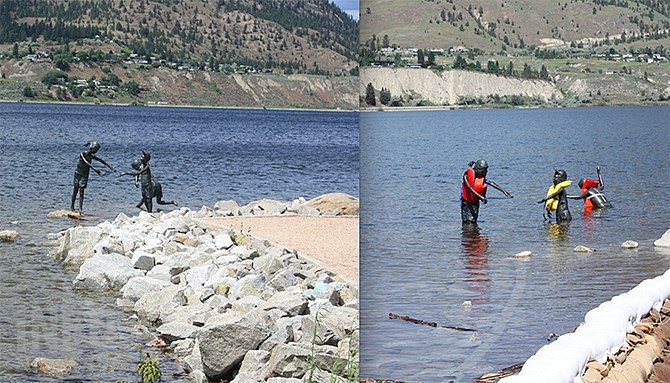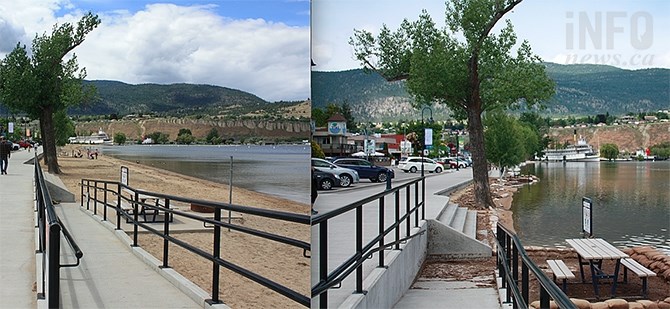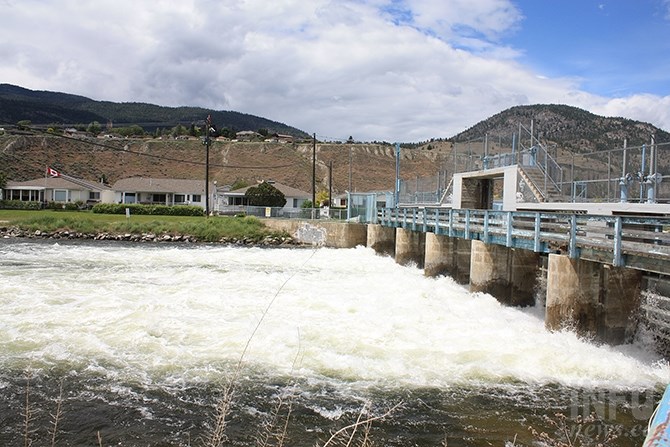
Still a ways to go to match the flood of 2017: Photo on left shows water level on Okanagan Lake today, June 15, 2020. The photo on right shows water level of the lake on June 5, 2017, when the Penticton sculpture known as 'Romp' needed life jackets.
(STEVE ARSTAD / iNFOnews.ca)
June 16, 2020 - 7:00 AM
If you live on or near Okanagan Lake, you'll want to keep a close eye on the weather for the next week or two.
Weekend rains added six or seven centimetres to the lake level, pushing it 22 cm above full pool, slightly higher than it was when it reached peak level in 2018, the last year of high water.
Shaun Reimer is the official in control of the Okanagan Lake Dam that controls Okanagan Lake levels. He says the ministry has been dumping as much as it can into the Okanagan river channel in Penticton weeks now. He has accounted for higher than normal spring runoff, but a soggy May and June has complicated that position — especially after weekend rains.
“It’s bad timing,” the Ministry of Forests, Lands, Natural Resource Operations and Rural Development Public Safety Section Head says.

There's still room on the beach in Penticton to sit and have an alcoholic beverage this year on Okanagan Lake, (left) but it was pretty marginal in 2017, shown at right.
(STEVE ARSTAD / iNFOnews.ca)
He suspects the lake will likely rise further before a drying trend occurs at the end of the week.
“There’s not much we can do about the rain. Kelowna has already had more rain than is usual for the whole month of June, and it’s only half over,” he says. “We’re looking at another big precipitation number for June, in addition to May."
He says the current conditions aren’t anything like the flood levels experienced in 2017, but if the rain keeps falling, the lake will continue to rise.
However, it's already passed the 2018 levels, except there are no flood barriers, shoreline protections and states of local emergency we saw in 2018.
It’s a little different situation from 2018, when the concern was a snowpack level higher than experienced this year. The lake level reached its peak on June 6 in 2018 when it reached 342.67 metres — 57 cm below 2017’s record high, which peaked June 9 (The lake slowly began dropping after that point, but it wasn’t until the end of July that it was back to full pool).
This year, the lake is at 342.7 metres on June 15, 22 cm above full pool, but the lake level continues to rise.
In recent days, there were some indications of the lake levelling off with a flattening out of runoff coming into the lake, as some of the tributaries have dropped off, but the weekend’s cool and rainy weather changed that. Most Okanagan areas have already exceeded monthly rainfall amounts for June — Kelowna's had 49 mm already when average is 46 mm — and the forecast calls for the showers until at least Wednesday.
Reimer says it’s a struggle to predict the high variability between weather systems in a season. April was relatively dry compared to May and June, which aren’t the best times to be receiving a lot more water into the lake.
“A normal May and June and we would have been fine. We had been aggressively dropping the lake in anticipation of the high snow pack, but the weather we’re seeing now is harder to manage when we’re at or beyond full pool like we are now. There’s less room for options,” he says.
“Somebody said climate is what you expect but weather is what you get. I don’t remember the last time we had this kind of rain at this time of year. There has been a lot of rain. Anything right now simply exacerbates the problem,” Reimer says.

The Okanagan River channel has been flowing beyond its maximum design capacity for weeks now, as spring rains replaced snow melt in Okanagan Lake.
(STEVE ARSTAD / iNFOnews.ca)
To contact a reporter for this story, email Steve Arstad or call 250-488-3065 or email the editor. You can also submit photos, videos or news tips to tips@infonews.ca and be entered to win a monthly prize draw.
We welcome your comments and opinions on our stories but play nice. We won't censor or delete comments unless they contain off-topic statements or links, unnecessary vulgarity, false facts, spam or obviously fake profiles. If you have any concerns about what you see in comments, email the editor in the link above.
News from © iNFOnews, 2020